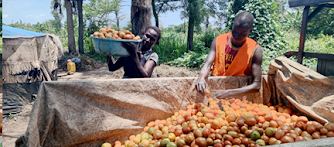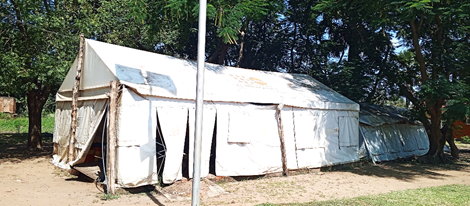DRDIP strengthens community resilience through fish farming in Kyegegwa
 |
| Fish farming preserved Itambabiniga wetland, Kyegegwa |
Within Itambabiniga; three
villages: Humura, Ruchinga Central and Bukere B have been transfigured when a
group of 95 (58 women, 37 men) committed members joined hands. They were
propelled by the Office of the Prime Minister's Development Response to
Displacement Impacts Project (DRDIP) to invest, preserve nature, create jobs
while extinguishing poverty within their community.
The group wrote a fish farming sub-project proposal which was approved and funded by DRDIP to a tune of Shs56 million. The group was supported by technical experts from a local partner to set up the fish farm. They paid for the services of the experts by themselves. Group members actively took part in the project implementation. Through, Labor-Intensive Public Works (LIPWs) methodology, each member could earn up to Shs5,500 per day: of this; each saved Shs1,500 and went home with Shs4,000 for each day of work.
 |
| Some of the catch from Itambabiniga pond |
Itambabiniga wetland, was a death trap before it was transformed into a fish farming point, according to local residents. There was uncontrolled flowing water and people used it for dumping rubbish. The odor was agonizing with incessant contamination causing pollution of the environment. The fish farm installation was useful in restricting unfriendly activities and with fencing, the place is now a clean and well protected income generating arena.
The project also controlled
pressures from crop farmers, sand harvesters, brick makers who were driving the
wetland towards extinction. These activities had affected aquatic life, but now
sounds of frogs and other living things have returned, indicating a successful
revival of the ecosystem.
At the same time, communities are
benefitting from the fish. "The wetland restoration is not just about
fish, it's about reclaiming our environment”, says Innocent Bahati, the
Community Project Management Committee Chairperson. “Our community wetland is
now a symbol of resilience", he boasts.
Bahati revealed that the group
have so far earned revenue amounting to Shs3,850,000 from fish sales. “We have
started saving accrued profits as a group so that we can think of expanding the
project by ourselves”. Bahati said, "through DRDIP, we've learnt not just
to fish for today, but to manage our resources for the future”.
The initiative is thus fostering
a robust saving culture by providing financial foundation to the group and to
individual members and households.
"The success in fish sales
has opened new doors for us. We are saving, investing, and securing a better
future for our families", one member said. A visit to the sub project site
showed group beneficiaries actively engaged in stocking fish and harvesting.
This demonstrates commitment for long-term sustainability of the project.
The project also incorporated
vegetable growing: cabbages, Sukuma wiki, eggplants, and green peppers are
planted around the fish pond to enhance dietary and to diversity group and
household income. "Beyond fish, we've cultivated a variety of vegetables
to enable us to call it a balanced diet at home when we sell to our esteemed
customers”, Esther Nikonwabiman revealed.



Comments
Post a Comment